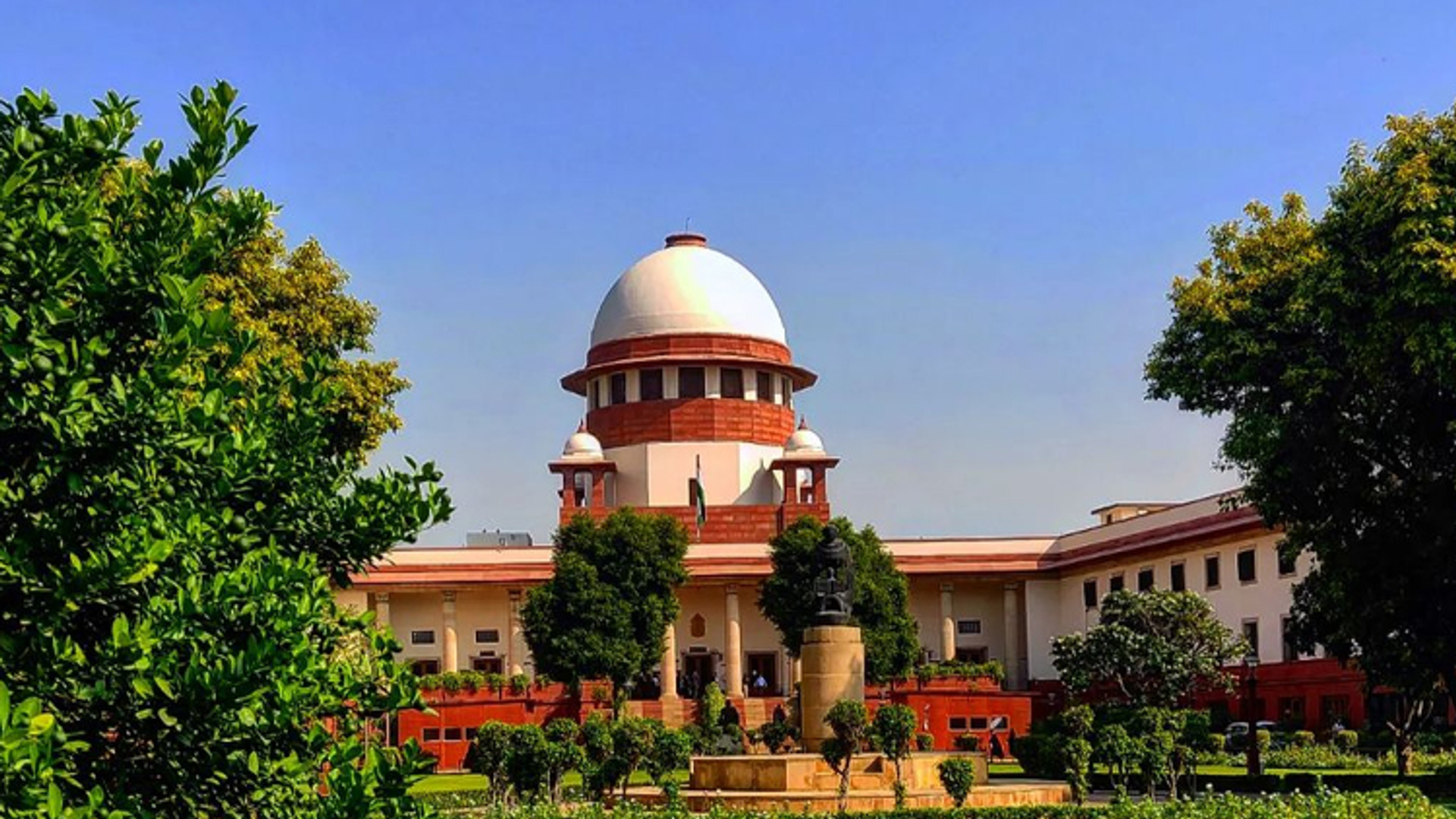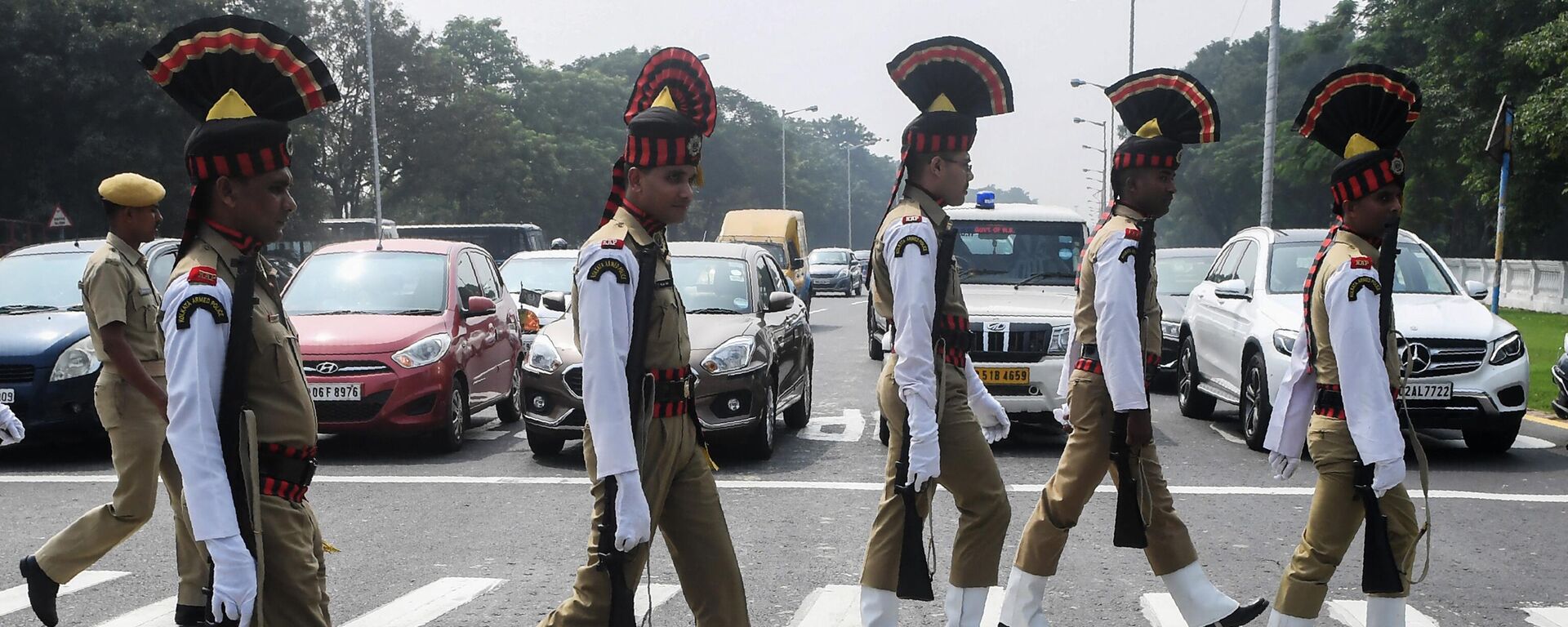https://sputniknews.in/20240701/new-indian-criminal-laws-to-ensure-speedy-justice-7747962.html
New Indian Criminal Laws to Ensure Speedy Justice
New Indian Criminal Laws to Ensure Speedy Justice
Sputnik India
The three new criminal laws – Bharatiya Nyay Sanhita, Bharatiya Nagarik Suraksha Sanhita and Bharatiya Sakshya Adhiniyam – were passed by the Indian Parliament in December last year thus taking a step forward to replace the full set of British-era penal codes.
2024-07-01T22:13+0530
2024-07-01T22:13+0530
2024-07-01T22:24+0530
sputnik opinion
india
government of india
delhi
new delhi
law and order
indian parliament
supreme court of india
colonial mindset
colonial rule
https://cdn1.img.sputniknews.in/img/07e8/07/01/7750718_0:15:751:437_1920x0_80_0_0_53e572bb00c3fda1023c67bff539cb0d.png
India on Monday took a major stride towards abolishing colonial-era laws as three fresh criminal codes – Bharatiya Nyaya Sanhita, Bharatiya Nagrik Suraksha Sanhita, and Bharatiya Sakshya Adhinyam – came into force from midnight.The new criminal laws will replace the colonial-era Indian Penal Code of 1860, the Code of Criminal Procedure of 1898, and the Indian Evidence Act of 1872 respectively.The main motive behind changing the laws is to enhance the speed of justice, and justice for all, as it stipulates the timeline for each step of the judicial process, from complaint filing to judgment delivery.New Laws Promote TransparencyIn this light, Supreme Court lawyer, Ashwini Upadhyay, told Sputnik India that these new laws are advantage for the common person as they enhance transparency and the speed of justice.He added that the new process permits online registration of applications and electronic serving of summons, thereby enhancing speed and transparency at the same time.Apart from this, the electronic evidence which was not considered valid in the colonial-era laws, is now valid under the new criminal laws, the expert noted.However, he added that this does not necessarily mean that judgment on every case will be delivered during the same period, but that the new laws are a stride towards securing judgment within 12 months (from the time of filing).Per the new laws, judgments are now required within 45 days of trial completion, and charges must be framed within 60 days of the first hearing.New Laws Equal for EveryoneAccording to media reports, the first FIR under section 285 of the new Penal Code, concerning a street vendor who obstructed traffic on the road near New Delhi Railway Station, was filed on the day of its adoption.Upadhyay said that although the reported complaint was not the first filed under the new laws, some media have chosen to publish it as such.Meanwhile, speaking about the unfavorable impact of the laws on the vulnerable segment of society, he said that the new rules apply equally to everyone."These laws should not be seen as targeting the vulnerable; rather, it should be understood that if anyone is caught doing wrong, then he (or she) will have to face the consequences," the lawyer stated.Moreover, Upadhyay suggested including a few more provisions, such as adding fake cases and false testimonies, etc. to the list of serious offenses, to further enhance justice.Deferment Demands BaselessA few days before the enforcement of the new laws, West Bengal State Chief Mamata Banerjee wrote to Prime Minister Narendra Modi, asking him to defer the implementation. The request was echoed by the Bar Council of Delhi on Monday.In the meantime, Upadhyay believes that the plea for a deferment of the new laws is baseless. He asserted that those who oppose the new laws ought to come up with constructive suggestions to make them more effective, instead of protesting for the mere sake of opposing them.
https://sputniknews.in/20231226/why-ditching-colonial-laws-is-key-to-attaining-sovereignty-for-india-5960987.html
india
delhi
new delhi
west bengal
Sputnik India
feedback.hindi@sputniknews.com
+74956456601
MIA „Rossiya Segodnya“
2024
Rahul Trivedi
https://cdn1.img.sputniknews.in/img/07e6/0c/13/136500_0:0:628:627_100x100_80_0_0_72097ff894c7446b70d2efafcb719720.jpg
Rahul Trivedi
https://cdn1.img.sputniknews.in/img/07e6/0c/13/136500_0:0:628:627_100x100_80_0_0_72097ff894c7446b70d2efafcb719720.jpg
News
en_IN
Sputnik India
feedback.hindi@sputniknews.com
+74956456601
MIA „Rossiya Segodnya“
Sputnik India
feedback.hindi@sputniknews.com
+74956456601
MIA „Rossiya Segodnya“
Rahul Trivedi
https://cdn1.img.sputniknews.in/img/07e6/0c/13/136500_0:0:628:627_100x100_80_0_0_72097ff894c7446b70d2efafcb719720.jpg
india abolishing colonial-era laws, bharatiya nyaya sanhita, bharatiya nagrik suraksha sanhita, bharatiya sakshya adhinyam, indian penal code of 1860, the code of criminal procedure act of 1898, the indian evidence act of 1872, new criminal laws in india to ensure speedy justice, supreme court of india, pil man of india ashwini upadhyay, zero fir, colonial-era laws, electronic evidence, justice within a year, west bengal chief minister mamata banerjee, bar council of delhi, mamata banerjee asks pm modi to defer implementation of new criminal laws, implementation of new criminal laws in india, amit shah
india abolishing colonial-era laws, bharatiya nyaya sanhita, bharatiya nagrik suraksha sanhita, bharatiya sakshya adhinyam, indian penal code of 1860, the code of criminal procedure act of 1898, the indian evidence act of 1872, new criminal laws in india to ensure speedy justice, supreme court of india, pil man of india ashwini upadhyay, zero fir, colonial-era laws, electronic evidence, justice within a year, west bengal chief minister mamata banerjee, bar council of delhi, mamata banerjee asks pm modi to defer implementation of new criminal laws, implementation of new criminal laws in india, amit shah
New Indian Criminal Laws to Ensure Speedy Justice
22:13 01.07.2024 (Updated: 22:24 01.07.2024) Three new criminal laws – Bharatiya Nyaya Sanhita, Bharatiya Nagarik Suraksha Sanhita, and Bharatiya Sakshya Adhiniyam – were passed by the Indian Parliament in December last year, taking a step towards replacing the full set of British-era penal codes.
India on Monday took a major stride towards abolishing colonial-era laws as three fresh criminal codes – Bharatiya Nyaya Sanhita, Bharatiya Nagrik Suraksha Sanhita, and Bharatiya Sakshya Adhinyam – came into force from midnight.
The new criminal laws will replace the colonial-era Indian Penal Code of 1860, the Code of Criminal Procedure of 1898, and the Indian Evidence Act of 1872 respectively.
The main motive behind changing the laws is to enhance the speed of justice, and justice for all, as it stipulates the timeline for each step of the judicial process, from complaint filing to judgment delivery.
New Laws Promote Transparency
In this light, Supreme Court lawyer, Ashwini Upadhyay, told Sputnik India that these new laws are advantage for the common person as they enhance transparency and the speed of justice.
"The biggest benefit is in how a person can file a Zero FIR at any police station. For example, if a crime happens to someone in West Bengal and the person is too terrified to file a FIR complaint there, he can come to Delhi and file a complaint there," Upadhyay explained.
He added that the new process permits online registration of applications and electronic serving of summons, thereby enhancing speed and transparency at the same time.
Apart from this, the electronic evidence which was not considered valid in the colonial-era laws, is now valid under the new criminal laws, the expert noted.
Additionally, the timeline under the new regulations has been fixed for everything starting from the filing of a FIR for police investigation, to the filing of a charge sheet, to the framing of charges by the magistrate, and finally, to the delivery of judgment, the Supreme Court advocate said. The process serves to fast-track the judgment, ensuring that justice is delivered within a year.
However, he added that this does not necessarily mean that judgment on every case will be delivered during the same period, but that the new laws are a stride towards securing judgment within 12 months (from the time of filing).
Per the new laws, judgments are now required within 45 days of trial completion, and charges must be framed within 60 days of the first hearing.
New Laws Equal for Everyone
According to media reports, the first FIR under section 285 of the new Penal Code, concerning a street vendor who obstructed traffic on the road near New Delhi Railway Station, was filed on the day of its adoption.
"Whoever, by doing any act, or by omitting to take order with any property in his possession or under his charge, causes danger, obstruction, or injury to any person in any public way or public line of navigation, shall be punished with a fine of up to five thousand rupees," Section 285 states.
Upadhyay said that although the reported complaint was not the first filed under the new laws, some media have chosen to publish it as such.
Meanwhile, speaking about the unfavorable impact of the laws on the vulnerable segment of society, he said that the new rules apply equally to everyone.
"These laws should not be seen as targeting the vulnerable; rather, it should be understood that if anyone is caught doing wrong, then he (or she) will have to face the consequences," the lawyer stated.
He then reminded that the colonial-era laws were in fact made with the intent of targeting the vulnerable class – who were Indians in the past. They sought to punish them for speaking out against the British government at the time, the advocate stressed.
Moreover, Upadhyay suggested including a few more provisions, such as adding fake cases and false testimonies, etc. to the list of serious offenses, to further enhance justice.
Deferment Demands Baseless
A few days before the enforcement of the new laws, West Bengal State Chief Mamata Banerjee wrote to Prime Minister Narendra Modi, asking him to defer the implementation. The request was echoed by the Bar Council of Delhi on Monday.
In the meantime, Upadhyay believes that the plea for a deferment of the new laws is baseless. He asserted that those who oppose the new laws ought to come up with constructive suggestions to make them more effective, instead of protesting for the mere sake of opposing them.
"These laws were discussed in Parliament; the standing committee had scrutinised them thoroughly before passing them. Now, if any law passed by Parliament can only be challenged in the Supreme Court, then neither the Bar Council nor any political party can challenge it," the Supreme Court advocate argued.



